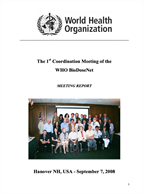
BioDoseNet
About
In 2007 WHO conducted a survey of biological dosimetry laboratories and their emergency-response capabilities in selected regions. The results indicated a robust capability, although there were few regional or national networks established. It was also evident that a global coordination along with technical cooperation was needed in order to ensure these networks will be engaged and fully-operational when supporting management of a large radiation emergency event.
WHO BioDoseNet is a global network of biodosimetry laboratories whose role is to support management and decision-making in cases of large radiation emergency events where the capability of individual laboratory is likely to be overwhelmed. In preparedness for such events, the BioDoseNet focuses on harmonization of methodology, quality assurance, knowledge-sharing, and intercomparision exercises.
biological dosimetry (biodosimetry)
"The laboratory or clinical methods used to measure or estimate the dose of ionizing radiation energy absorbed by an individual. Biodosimetry tools measure the dose to internal organs and tissues from external exposure and internal contamination"
The BioDoseNet has been established to fulfill WHO's mandate under the International Health Regulations (IHR, 2005) and its implementation plan.
Documents

An update of the WHO BioDoseNet
In 2007 WHO established an international network of biodosimetry laboratories, the BioDoseNet. The goal of this network was to support international cooperation...

Biodosimetry is an essential tool for providing timely assessments of radiation exposure, particularly when physical dosimetry is unavailable or unreliable....

Global networking for biodosimetry laboratory capacity surge in radiation emergencies
For the public health management of radiation emergencies, one of the essential components of integrated risk assessment is to quickly and accurately assess...

The 1st Coordination Meeting of the WHO BioDoseNet
The 1st Coordination Meeting of the WHO BioDoseNet was held in Hanover, New Hampshire, USA, in September 2008. Representatives from 28 countries and more...
Meetings
Resources
- An Update of the WHO BioDoseNet: Developments Since Its Inception (2016)
- The Capacity, Capabilities and Needs of the WHO BioDoseNet Member Laboratories (2012)
- Global Networking for Biodosimetry Laboratory Capacity Surge in Radiation Emergencies (2010)
- WHO 1st Consultation on the Development of a Global Biodosimetry Laboratories Network for Radiation Emergencies (BioDoseNet) (2009)
- TENEB - Towards a European Network of Excellence in Biological dosimetry

